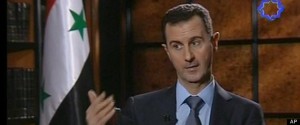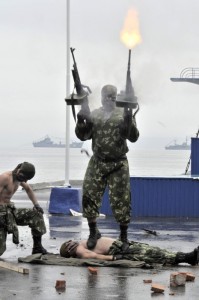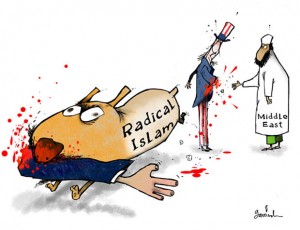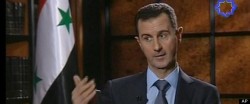Russia has saved the world from loose WMD before; in the aftermath of the Soviet Union’s dissolution, Russia arranged the Lisbon Protocols with Ukraine, Kazakhstan, and Belarus to systematically destroy or return massive nuclear stockpiles. If only Syria had the stability of post-Soviet chaos. If the Syrian “Lisbon Protocol” fails and the regime collapses, the presence of WMD is a guarantor of intervention, most likely by the US.

The Russian arrangement is not yet official and may be Assad’s play for time. The chemical weapons are potentially more powerful against the US than rebels. Likely, a reality causing Secretaries Kerry and Hagel to eschew the term “regime change” is that the danger of Syria’s chemical weapons (CW) to the US increases as Assad teeters. Though rightfully loathed, Assad and his men secure their CW and have so far resisted handing party favors to associates.
As the regime crumbles, CW facilities may find themselves overwhelmed or guards shifted to critical fronts, doors open to terrorists or unscrupulous brokers. Though some argue we do not have a dog in Syria’s fight, a whole henhouse is under threat if those dogs break loose. There are only three likely solutions if a Russian deal fails:
-

This can work for both of us. “Kill yourself,” is my final offer. 
We understand your position. Meet us halfway at, “die and go to hell.” Political Agreement: If only all parties could agree to a two-part plan to stop murdering one another and share power. Guards stay on post, conflict ends, and world moves on after the noble work of aiding refugees. The rump of Assad’s regime keeps its pulse and constant pressure to the switch. Unfortunately, with parties whose non-negotiable point is that the opponent “die”, and multiple Al-Qaeda (AQ) militias, this seems nigh impossible.
-

Who needs norms, human rights, or excuses when you have Machiavelli and a hand cannon? Russian Military Operations: Russia is a big fan of Syria. Russia has a naval presence in the country and a large portion legitimacy and energy policy invested in the management of the regime. Russia would like to keep Syria’s CW from groups connected to their own domestic extremistss. Most cynically, with very public domestic problems, military operations to save the world from CW seem a likely move for President Putin. In the words of Orwell, “War is Peace.”
Russia has particular advantages in their contact with Assad’s regime. They likely could access exact locations for the regime’s CW in a pinch. The world has no high standard for Russian intervention, so a sting operation to grab or destroy the vast stores of CW without any follow-on reconstruction would not be shocking to the global community. This also serves as a guise for direct military support for regime survival.
That said, Russia has managed the Syria narrative well and knows the US could not abide Assad’s weapons falling to extremists. Russia has enjoyed the umbrella of security provided by primarily US operations against extremists in the Middle East and likely has no desire to get bogged down or gain unwanted attentions. Russia is still just “a” rather than “the” “Great Satan.” It would likely leave the mess to the final and least pleasant option:
-

It’s getting very… VERY old. American Intervention: In a conflict with too many “thems” and not enough “us’s”, the fog of Syria’s war is thick. Unfortunately, nothing is unclear about the peril of loose CW or the peril of a necessary US military response.
Boots: The number and location of all weapon sites remains a mystery, requiring resources spent in the search phase of “seek and destroy” operations. The time or scale necessary also removes the critical element of surprise. A lengthy chain of smaller operations warns enemies to secure weapons at un-sanitized sites while they still can. A massive simultaneous operation would strain an already creaking military budget and drop the US fully into the war, leaving the US in control of large swaths of territory and people it could not just leave to extremists.
Strikes: Dead suffocated civilians, lack of verification, and PR for terrorists lies at the end of an aerial campaign. Though the US has invested in weapons that can neutralize chemical weapon stockpiles, most leave a large margin of error or have almost as toxic byproducts. The explicit refusal to consider striking Assad’s chemical weapon stockpiles should be evidence enough of the unsavoriness of such an operation.
Unfortunately, loose CW is not an option in a war-torn hellscape crawling with groups who have plotted against US interests and citizens for over two decades.

Though an embarrassing stolen march, the Russian deal is the US’s best chance is to avoid Syria. Nonetheless, US policymakers must plan for the worst while stumbling upon the best. The US must accept the real-world possibility of Assad’s collapse and subsequent unlocking of Pandora’s Chemical Box; many rightly desire to have nothing to do with the conflict, but while we may not be interested in Syria, Syria is very interested in us.
Matt Hipple is a surface warfare officer in the U.S. Navy. The opinions and views expressed in this post are his alone and are presented in his personal capacity. They do not necessarily represent the views of U.S. Department of Defense or the U.S. Navy.

